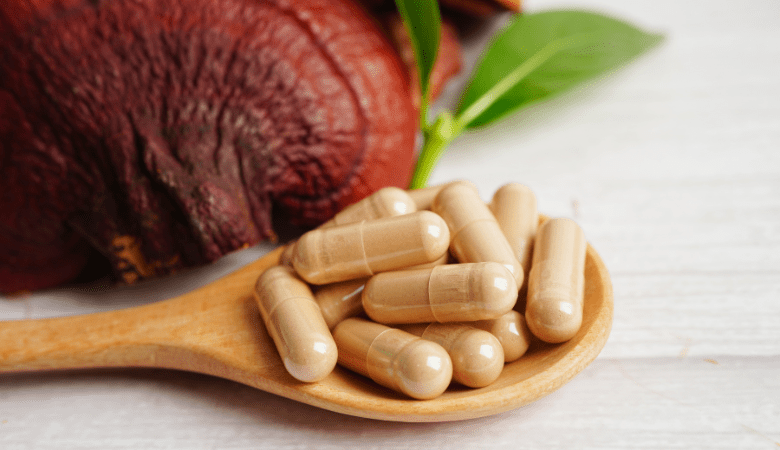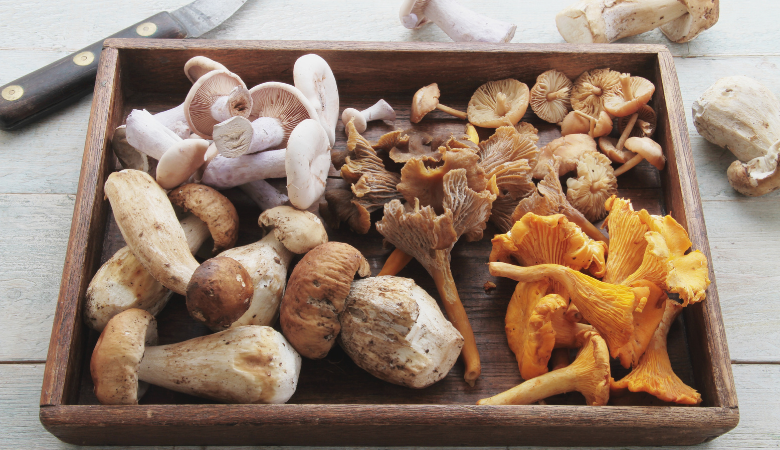
Are Mushrooms Anti-Inflammatory? Exploring Potential Benefits and Research
|
|
Time to read 7 min
This store requires javascript to be enabled for some features to work correctly.
|
|
Time to read 7 min
Mushrooms made a name for themselves in the world of holistic medicine several centuries ago, but it hasn’t always been well understood how they work. Now, modern researchers are working to uncover the hidden mechanisms behind mushrooms' potential health benefits, like their adaptogenic and nootropic effects. One important question is at the forefront: Are mushrooms anti-inflammatory?
Because inflammation plays a critical role in many chronic diseases, finding natural ways to combat it has become a focus of scientific research. Here, we will delve into the available scientific literature to examine the evidence supporting the claim that mushrooms possess anti-inflammatory properties.
To help give a clear picture, let’s start from the top:
Table of Contents
Many mushrooms possess potential anti-inflammatory benefits.
Using a high-quality mushroom extract is the best way to reap the benefits of medicinal mushrooms.
You may choose a mushroom stack, or a blend of different medicinal mushrooms, to reap these anti-inflammatory benefits to the full extent.
Before exploring the potential anti-inflammatory properties of mushrooms, it is important to grasp the entire concept of inflammation, the role it plays in the body, and why anti-inflammatory mechanisms may be behind some of the most sought-after benefits associated with medicinal mushrooms.
Inflammation is the body's natural defense mechanism that protects against harmful stimuli, such as pathogens or tissue damage. On one hand, inflammation is a good thing. It’s the immune system’s “first spark” that helps to destroy pathogens in their tracks.
However, too much inflammation is a bad thing. Chronic inflammation can contribute to the development of various diseases, including heart disease, diabetes, and certain types of cancer. It also causes side effects, like fatigue, digestive upset, and poor immune function.
So, for those dealing with high inflammation levels, finding a natural, daily anti-inflammatory supplement can be life-changing. For many, medicinal mushrooms may be the answer, but let’s look further into the evidence to help explain how medicinal mushrooms may help lower inflammation levels.
To further understand how medicinal mushrooms may help to reduce inflammation, we can look at a 2017 review published in the journal Food Chemistry titled “Anti-inflammatory properties of edible mushrooms: A review.” This review explains the cause and effect relationship between inflammation and medicinal mushroom’s bioactive compounds:
“Deficiencies of antioxidants, vitamins, and microelements, as well as physiological processes, such as aging, can affect the body's ability to resolve inflammation. Mushrooms are rich in anti-inflammatory components, such as polysaccharides, phenolic and indolic compounds, mycosteroids, fatty acids, carotenoids, vitamins, and biometals….Recent reports indicate that edible mushroom extracts exhibit favorable therapeutic and health-promoting benefits, particularly in relation to diseases associated with inflammation.”
In other words, mushrooms are rich in bioactive compounds that are believed to contribute to their potential health benefits. Many of these compounds, but especially a class of polysaccharides called “beta-glucans”, have been extensively studied for their anti-inflammatory effects.
In order to understand this better, let’s narrow it down to specific medicinal mushrooms and the research surrounding them:
Several mushroom varieties have been studied for their potential anti-inflammatory properties. Let's explore some of the most notable ones:
Reishi mushrooms (Ganoderma lucidum) have been used in traditional medicine for centuries due to their perceived health benefits. They are usually highly regarded as an adaptogen, or a supplement that regulates the body’s stress response. Most often, people think of reishi as a sleep supporting, relaxing supplement, but some evidence shows that it may also help to relieve inflammation.
A 2014 study found that reishi may help to reduce the anti-inflammatory and allergic response via its immune-modulating mechanics. More specifically, Reishi has been shown to alter inflammation pathways in white blood cells. Reishi also has powerful antioxidant properties, meaning it has the power to help rid the body of free radicals, or rogue cells that cause tissue damage and increase inflammation.
Another study found that reishi may help to reduce inflammation in the brain caused by reduced oxygen exposure. Another found that reishi may help to reduce muscular damage during exercise through the same mechanisms.
More research is needed to understand how these Reishi benefits may be applied, but there is some interest surrounding the use of Reishi for various chronic inflammatory illnesses, such as ulcerative colitis.
Lion’s Mane mushrooms have been thought for centuries to help improve cognitive performance and energy, balance mood, and boost immunity, but researchers have also found it to possess high antioxidant activity, which means it may help to prevent inflammation caused by free radicals.
Some evidence suggests that lion’s mane can help to improve neurogenesis, the growth of neurons in the brain, which is the reason that it’s gained such a following as a nootropic supplement.
Lion's Mane coffee is a popular way to consume lion's mane mushrooms and reap its cognition-boosting benefits. Choosing a low-caffeine mushroom coffee may also be a great way to reap the potential anti-inflammatory benefits of lion's mane and other functional mushrooms.
Tremella is an edible mushroom that is sometimes used in cuisine, but it’s most often used in alternative medicine and as a wellness supplement. This mushroom, known as the ‘beauty mushroom” is most often linked to anti-aging and moisturizing benefits, but it may do much more.
A 2017 study, for instance, found that Tremella reduced the incidence of human skin fibroids caused by hydrogen peroxide, likely due to Tremella’s high antioxidant content, which can help to ward off free radicals that damage tissues.
Another study from the same year describes potent anti-inflammatory benefits, which may help in managing certain inflammatory conditions, though more research is needed to explore the use of Tremella to treat any condition.
Shiitake mushrooms (Lentinula edodes) are widely consumed for their distinct flavor and nutritional value. There is, however, a wide range of evidence to support shiitake’s potential anti-inflammatory effects.
Like many other mushrooms, shiitake are a rich source of polysaccharides like beta-glucans, which have been linked to various anti-inflammatory and immune-regulating benefits. In one study, researchers gave people two dried shiitake daily and found that daily dosing for one month was enough to significantly improve immune markers and inflammation levels.
Shiitake is also regarded as one of the best mushrooms for gut health. The gut plays a huge role in regulating inflammatory signals, so there may be an unidentified link between gut-boosting mushrooms and anti-inflammatory effects.
Mushrooms show promising potential as a natural anti-inflammatory food source. More specifically, the bioactive compounds found in mushrooms, such as polysaccharides and phenolic compounds, have been shown to possess anti-inflammatory properties in various studies, which means that high-quality mushroom extracts in supplement form may have anti-inflammatory benefits.
While more human studies are needed to further validate these effects, incorporating a variety of mushrooms into a balanced diet may contribute to overall health and potentially help reduce chronic inflammation.
However, it is essential to note that mushrooms should not be considered a sole solution for treating inflammation or its related conditions. They can be a valuable addition to a well-rounded anti-inflammatory diet and lifestyle.
Future research should focus on conducting more human studies to further investigate the anti-inflammatory effects of mushrooms. Additionally, exploring the potential synergistic effects of combining different mushroom varieties or integrating mushrooms with other anti-inflammatory foods could provide valuable insights. Many people like to stack mushrooms for more full-spectrum benefits. (Our Lucid Mushroom + Nootropic Stack is the perfect way to take advantage of the full scope of mushroom benefits!)
It is crucial to consult with a healthcare professional or registered dietitian before making any significant dietary changes or relying solely on mushrooms for managing inflammation or related conditions. Some mushrooms may interact with medications or cause allergic reactions for some people.
If you want to take full advantage of the "functional" side of functional mushrooms, consider a mushroom super-blend like our Lucid Coffee, Chai, or Matcha powders. It takes full advantage of the benefits of these superfood mushrooms by pairing Cordyceps, Maitake, Tremella, and Lion's Mane, plus powerful nootropics, like BCAA's, L-Theanine, Alpha-GPC, and more.
